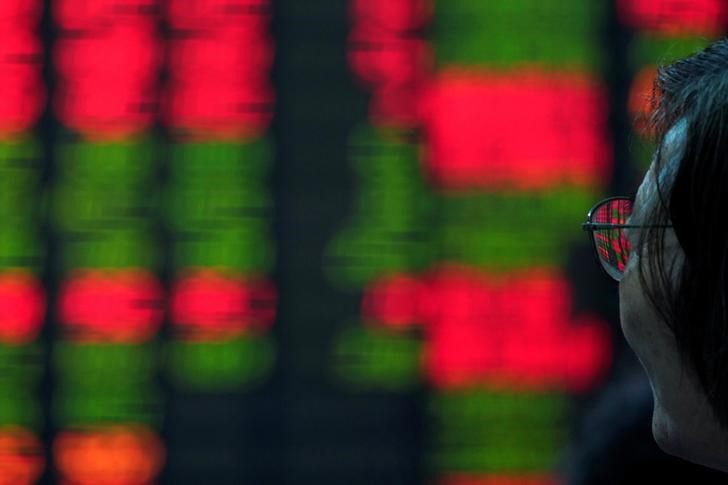By Samuel Shen and Patturaja Murugaboopathy
SHANGHAI/BENGALURU (Reuters) - Concerns that a sharp fall in Chinese stocks this year will turn into a rout as China and the United States exchange barbs on trade are overdone, some investors say.
By some estimates, the stock market is pricing in sharper downgrades in corporate earnings for 2019 than analysts are forecasting, suggesting that investors are overly pessimistic.
Instead, these fund managers, investors and equity analysts, see limited downside potential for Chinese stocks, pointing to relatively low valuations historically and signs that some buyers are starting to put money back into the market.
Shanghai's benchmark equity index (SSEC) fell as much as 18.6 percent to 2,691 points by early July, making it the worst performing major global index. It has since edged back up to 2,859.
"Why is the market so weak? Because investors are pessimistic, or more precisely, over-pessimistic," said Zhou Liang, founder of Shanghai Minority Investment Management, a private fund house largely invested in banks, insurers and developers.
Indeed, the forward price/earnings ratio of the Shanghai index, based on earnings expectations for 2018, is around 10, the lowest level since panic selling in early 2016 when the market was still dealing with the hangover from the 2015 financial crisis. They are also 40 percent lower than forward PE ratios in U.S. stocks.
The drop in Chinese shares this year has been driven by concerns about a slowdown in the world's second-biggest economy and that China would be worse off in a trade war with the United States.
U.S. President Donald Trump, who has taken a hard line on trade with several countries around the world, has applied tariffs to some goods imported from China and threatened taxes on the remaining imports.
These factors have prompted an overly pessimistic view on the corporate earnings outlook for 2019, says Societe Generale (PA:SOGN).
"The market is discounting a 5 percent decline in next year's earnings," the bank said in a research note, when analysts' consensus forecast is for a rise of 13 percent.
"Further downside would only be consistent with a hard landing scenario, whereby profit momentum turns negative and earnings do not grow in the next two years".
BARGAIN HUNTERS
Gao Ting, head of China strategy at UBS Securities, says Chinese stock values are signalling that China's economic growth will slow sharply.
"Interestingly, the overall situation we see is not that terrible, both in terms of economic fundamentals, or corporate profit."
China reported last week that economic growth slowed in the second quarter to 6.7 percent from 6.8 percent in the first quarter, although most economists agree the country is on course to meet its 2018 growth target of around 6.5 percent.
In a sign that the low valuations are attracting bargain hunters, the China Southern CSI500 ETF (SS:510500) - used by many institutions to increase exposure to a range of blue-chips - saw its assets under management (AUM) rise to a record high of 26 billion yuan in the week ended July 13.
The Huatai-PB CSI300 ETF (SS:510300), which tracks China's blue-chip CSI300 index (CSI300), saw its assets under management rise to 23 billion yuan as of mid July from 22.1 billion yuan at the end of the first quarter even though the market fell 12 percent during that period.
Some money is also flowing in from foreign investors as investment in Shanghai and Shenzhen stock markets from Hong Kong, under the stock connect scheme linking the markets, swung to a net inflow in the first half of July from a net outflow in the second half of June.
"Barring a major economic or financial crisis, we're at a new, historic bottom," brokerage BOC International said.
NO TIME TO RUSH
Still, other investors remain cautious, in part because the potential for a trade war between China and the United States and how that might be played out means the outlook is too unpredictable.
The low valuations mask unprecedented political uncertainty, said Xie Donghai, chairman of hedge fund manager Shanghai Entropy Asset Management.
"The biggest uncertainty this year is political," he said.
"The risks of investing in an individual stock becomes tremendous, and such risks are beyond imagination," Xie said.
Even if Chinese stocks are forming a cyclical bottom right, there is no rush to invest, said Hong Hao, chief strategist at BOCOM International. That is because historically, China's stock market cycles show sharp and rapid rises, but troughs tend to be long and shallow.
"Don't use valuations if they're not at extreme levels," he said at a conference recently.

"We should know how to cope with risks in trading. It's like playing Texas Hold'em Poker: you don't go all-in and risk losing your shirt."